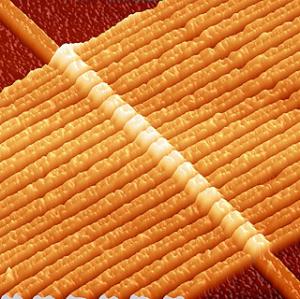Cut PC energy use by 99%: Use a memristor
 That’s not your grandma’s knitting. It’s an atomic force microscope image of 17 memristors, courtesy of HP Lab’s J.J. Yang, via Wikimedia. A London team thinks it has figured out a better weave. Or more precisely, a better material.
That’s not your grandma’s knitting. It’s an atomic force microscope image of 17 memristors, courtesy of HP Lab’s J.J. Yang, via Wikimedia. A London team thinks it has figured out a better weave. Or more precisely, a better material.PC and gadget users - ie, anyone reading this story - as a group contribute to global CO2 emissions probably more than the airline industry does. Every time billions of us plug in, recharge, refresh, retrieve, reboot, download, upload, store, save, italicize, underline, boldface, capitalize, minimize, maximize, delete, surf, click or stream (you get the picture), we are drawing energy.
Now, a London-led research team thinks it has found a way to slash the energy consumption of at least some of our computing functions by 99 percent.
The key: Use a different material to make “memristors.”
Memristors are the elusive electronics components that are supposed to soon replace other semiconductor and memory technologies to support faster and denser memory. They are both memory chips and resistors rolled into one circuit.
Leon Chua at the University of California Berkeley first hypothesized memristors 41 years ago, but no one successfully made a working laboratory version until 2008, when HP announced a breakthrough. Two years later, HP entered a joint venture with chip maker Hynix and targeted commerical production by 2013.
The problem, as a story on the BBC website points out, is that memristors require “expensive or exotic materials.”
University College London to the rescue! Forget the exotic materials. Instead, use a close relative of silicon called silicon oxides, says UCL’s Anthony Kenyon, who led a collaborative research team from the UK, France and Spain.
“That would make them easy and cheap to integrate into existing manufacturing techniques,” the BBC reports, in summarizing the team’s findings.
The crew serendipitously stumbled upon the idea while looking into silicon for LEDs.
Kenyon and his student Adnan Mehonic discussed their work at the European Materials Research Society conference in Strasbourg, France last week.
“As they described …, the energy required to switch the state of their devices - the energy it would take to store or retrieve a bit of information - is just a hundredth of that in existing flash memory, and significantly faster,” the BBC writes.
In other words, you could potentially slash energy consumption by 99 percent every time you hit the “open file” or “save” button on your computer.
Multiply that by the number of PC and gadget junkies in the word, and the planet’s CO2 footrpint could lose at least a couple of toes, if not a heel. This sounds like an idea worth kicking into action.
You can return to the main Market News page, or press the Back button on your browser.

